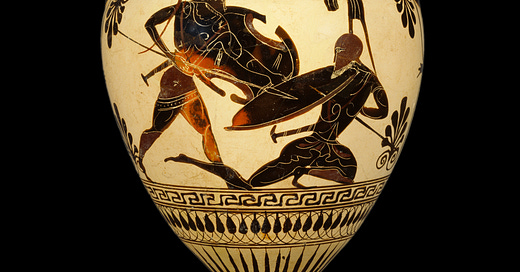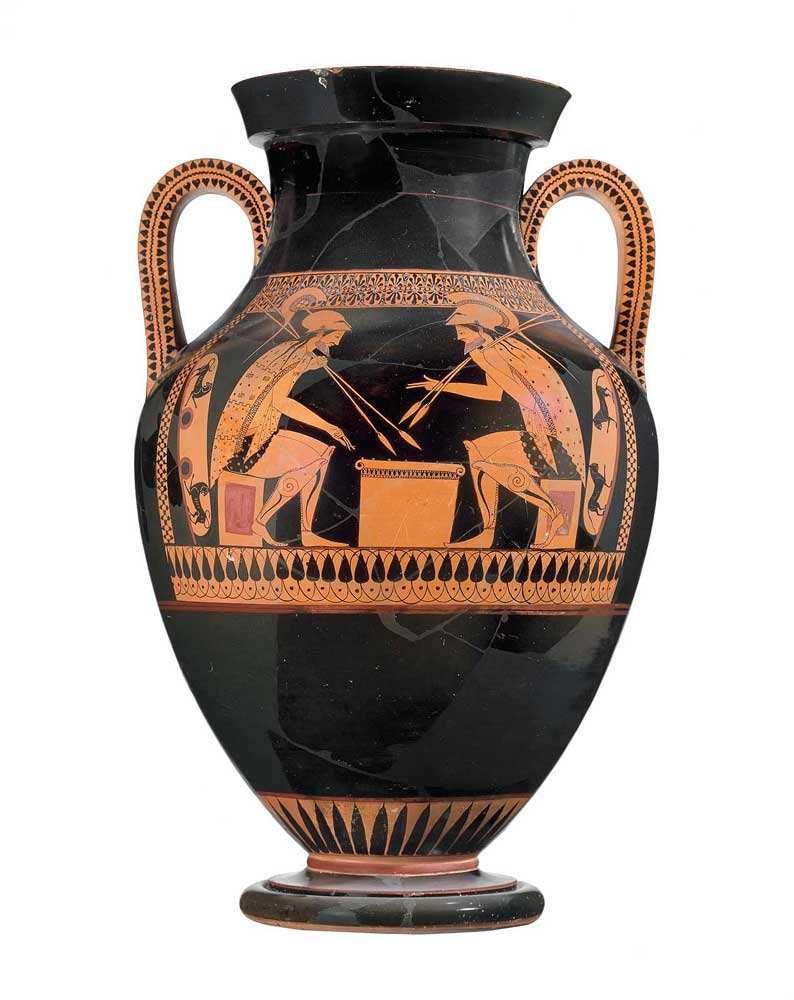This is one of a few posts dedicated to Iliad 11. As a reminder, these posts will remain free, but there is an option to be a financial supporter. All proceeds from the substack are donated to classics adjacent non-profits on a monthly basis.
Book 11 of the Iliad is one of those battle books that often get lost in conversations about the whole. But the poem does contribute critically to the plot: enough of the prominent Greeks are wounded that the battle begins to turn definitively in the Trojans’ favor. Achilles, watching from the sidelines, notices, and sends Patroklos to investigate. Nestor tells Patroklos a rather long story to persuade him to either convince Achilles to return to war or to lead the Myrmidons to battle in Achilles’ place.
These contributions to the plot make Iliad 11 essential. But the book has some other, more nuanced aspects as well. As I discussed in the first post on book 11, the wounding of heroes, particularly Diomedes, engages with extra-Iliadic traditions in fascinating ways. The book also advances the epic’s strategy of deferring Achilles’ appearance. This time, however, Achilles appears briefly. And what we make of his actions changes how we approach his character.

We find Achilles eagerly watching the action, despite the fact that it is taking place on the other side of the Achaean fortifications.
Homer, Iliad 11.596-615
“So they were struggling like a burning fire
And Neleus’ horses were bringing Nestor out of the war,
Covered in sweat as they also drove Makhaon, the shepherd of the host.
Shining Achilles recognized him when he saw him.
For he was standing on the stern of his huge-hulled ship,
Watching the terrible conflict and the lamentable retreat.
He quickly turned to his companion Patroklos and spoke
To him next to the ship. He heard as he came from their dwelling
Like Ares himself, and this was the beginning of his trouble.So, the brave son of Menoitios spoke first:
Why are you calling me, Achilles? What need do you have of me?Swift footed Achilles spoke to him in answer:
“Shining son of Menoitios, most cherished to my own heart,
Now I think that the Achaeans are about to stand begging
Around my knees. For a need comes upon them, and it is no longer tolerable.But come, now Patroklos dear to Zeus, go ask Nestor
Who that man is he leads wounded from the war.
Certainly he looks from this angle in every way like Makhaon,
Asclepius’ son, bit I cannot see the man’s eyes,
Since the horses raced past me in their eager stride.”῝Ως οἳ μὲν μάρναντο δέμας πυρὸς αἰθομένοιο·
Νέστορα δ’ ἐκ πολέμοιο φέρον Νηλήϊαι ἵπποι
ἱδρῶσαι, ἦγον δὲ Μαχάονα ποιμένα λαῶν.
τὸν δὲ ἰδὼν ἐνόησε ποδάρκης δῖος ᾿Αχιλλεύς·
ἑστήκει γὰρ ἐπὶ πρυμνῇ μεγακήτεϊ νηῒ
εἰσορόων πόνον αἰπὺν ἰῶκά τε δακρυόεσσαν.
αἶψα δ’ ἑταῖρον ἑὸν Πατροκλῆα προσέειπε
φθεγξάμενος παρὰ νηός· ὃ δὲ κλισίηθεν ἀκούσας
ἔκμολεν ἶσος ῎Αρηϊ, κακοῦ δ’ ἄρα οἱ πέλεν ἀρχή.
τὸν πρότερος προσέειπε Μενοιτίου ἄλκιμος υἱός·
τίπτέ με κικλήσκεις ᾿Αχιλεῦ; τί δέ σε χρεὼ ἐμεῖο;
τὸν δ’ ἀπαμειβόμενος προσέφη πόδας ὠκὺς ᾿Αχιλλεύς·
δῖε Μενοιτιάδη τῷ ἐμῷ κεχαρισμένε θυμῷ
νῦν ὀΐω περὶ γούνατ’ ἐμὰ στήσεσθαι ᾿Αχαιοὺς
λισσομένους· χρειὼ γὰρ ἱκάνεται οὐκέτ’ ἀνεκτός.
ἀλλ’ ἴθι νῦν Πάτροκλε Διῒ φίλε Νέστορ’ ἔρειο
ὅν τινα τοῦτον ἄγει βεβλημένον ἐκ πολέμοιο·
ἤτοι μὲν τά γ’ ὄπισθε Μαχάονι πάντα ἔοικε
τῷ ᾿Ασκληπιάδῃ, ἀτὰρ οὐκ ἴδον ὄμματα φωτός·
ἵπποι γάρ με παρήϊξαν πρόσσω μεμαυῖαι.
There are some interesting responses from ancient scholars. Variously, they see Achilles’ viewing of the battle as an indication of his character and a creation of suspense.
Schol Tb ad Hom. Il. 11. 600-1 ex
“Achilles is shown to be a lover of war here by his viewing of the battle. Still, the poet crafts this in anticipation for Achilles’ return.”
τὸ φιλοπόλεμον ᾿Αχιλλέως ἐνδείκνυται τῷ θεωρεῖν τὴν μάχην. ἅμα δὲ καὶ ᾠκονόμησε ταύτην ὁ ποιητὴς πρὸς τὴν ἔξοδον ᾿Αχιλλέως.
There is also interest in the action Achilles takes here:
Schol. T ad Hom. Il. 11.611 ex
“It is strange that [Achilles] sends [Patroklos] out to the scene of someone wounded”
ἄτοπον γάρ ἐστιν εἰς τὴν σκηνὴν τοῦ τρωθέντος ἀποστέλλειν αὐτόν.
But many comments attend to the brief narrative foreshadowing “and that was the beginning of evil for him” (κακοῦ δ’ ἄρα οἱ πέλεν ἀρχή).
Schol. bT ad Hom. Il. 11.605 ex
“The declaration makes the audience eager to learn what this evil might be. The poet creates this with a brief indication. If he had done more, he would have ruined the order of events and weakened the poem.”
ἀναπτεροῖ τὸν ἀκροατὴν ἡ ἀναφώνησις ἐπειγόμενον μαθεῖν, τί τὸ κακὸν ἦν. προσοχὴν δὲ ἐργάζεται διὰ βραχείας ἐνδείξεως· εἰ γὰρ πλέον ἐπεξειργάσατο, διέφθειρεν ἂν τὸν ἑξῆς λόγον καὶ ἀπήμβλυνε τὴν ποίησιν.
I think that the comments on Achilles’ character show something of a limited understanding. I think there is an argument to be made throughout the Iliad that when characters who are not engaged in the conflict are watching the battle they function in part as stand-ins for the external audience, helping us to see the action in a different way. In this, I think about the function of the chorus in Greek tragedy—the choruses are far from neutral parties in Athenian drama, but they are nonetheless capable of acting as vehicles between the main story and the audience. Achilles, standing on the stern of his ship, watching with interest both helps us remember that these events are extraordinary and provides us with a few moments respite from the conflict.
Achilles, however, is not like any other character: when he watches, his interest is something altogether different. His stance in part reminds me of those moments when Zeus retreats to watch the battle from somewhere else. A primary difference is that Achilles’ interest is not neutral: as he himself expresses in this passage, the increased suffering of the Achaeans makes it likely that they will appeal to them again. Indeed, ancient scholars have commented on Achilles standing and watching the battle as evidence of his love of war (he just likes to watch fighting, I guess) or his love of honor (is he rooting for the Achaeans to suffer more quickly so that they will offer him more to return?)
As is usually the case, I think that the ambiguity of the scene is part of the point. While Achilles does say that the Greeks will be begging him soon, he swore an oath not to return to battle until the fire reaches his ships in Iliad 9. That recent action makes it difficult to argue that Achilles is simply waiting to be compensated or glorified. He is concerned about a particular person being injured and wants to know what is actually happening in the conflict. Achilles’ limited knowledge here, I think, echoes that part of him that is not super human: his knowledge of others’ deaths and fates. Indeed, this scene’s narrative commentary “and it was the beginning of his trouble” points to the limits of human knowledge. The irony we as the audience know is that Achilles prayed for the Achaeans to suffer to make up for his dishonor and he is just now about to send his own cherished Patroklos out there to become part of the comeuppance.
As Jinyo Kim writes in her 2001 book The Pity of Achilles, the hero’s watching of the conflict is a confirmation of Achilles’ concern for the Greeks: the primary arguments that moved him in the earlier embassy (see especially 103-113). She notes that Achilles’ language about how dire the situation is (λισσομένους· χρειὼ γὰρ ἱκάνεται οὐκέτ' ἀνεκτός) repeats what Nestor said in the previous book. As Kim notes, Achilles knows the situation is bad and does not need to send Patroklos to confirm it. Instead, he is demonstrating a concern for others that is consonant with his characterization in book 9 and his final turn to empathy in book 24.
Objections to this argument will point out that Achilles himself remains distant: Kim argues that Patroklos here begins to function as a ritual replacement for Achilles in book 11, rather than 16. I think this argument works well to help us understand that Achilles is showing his concern for the Achaeans through Patroklos because he is constrained by the oath he took at the end of book 9. Achilles looks like he is cruel and Nestor expresses criticism to that effect. But I think Patroklos anticipates this when he says to Nestor: “Divine old man, you know what kind of guy that terrible man is. He would quickly blame the blameless” (εὖ δὲ σὺ οἶσθα γεραιὲ διοτρεφές, οἷος ἐκεῖνος / δεινὸς ἀνήρ· τάχα κεν καὶ ἀναίτιον αἰτιόῳτο (11.653-654). A scholiast explains Patroklos’ comments as somewhat self-defensive: “He is pointing to Achilles’ irascibility, gaining for himself some pardon for not persuading him” ἐπιτείνει δὲ αὐτοῦ τὸ θυμικόν, συγγνώμην ἑαυτῷ ποριζόμενος τοῦ μὴ πεῖσαι αὐτόν, Schol. bT Ad Hom. Il. 11.654).
But suspect that there is something more personal. The adjective deinos—which famously can mean ‘terrible, marvelous, amazing’—is only applied to mortals in limited conditions in the Iliad. At its root, it is related to verbs of fear and amazement. Gods leaving or entering battle often receive this description, but Helen uses it in addressing Priam in book 3 (171). There’s a familiar sense to this personal use, I think, indicating that the speaker is full of amazement and confusion at the target’s behavior. Patroklos not understand Achilles’ behavior, just as the members of the Embassy in book 9 are confused.




